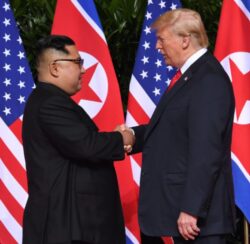by Charles Knight
Following is a comment to an article by Duyeon Kim, “How to tell if North Korea is serious about denuclearization,” Bulletin of the Atomic Scientists, 29 October 2018, midway between the Singapore Summit and the Hanoi Summit.
This comment makes one key point that many American analysts ignore:
North Korea has in the past and will now insist that negotiations about Korean nuclear disarmament include any regional nuclear capabilities which it considers to be threats to its security. In this comment, I am not taking a position on what the particular outcome of nuclear disarmament negotiations should be. Rather, I am saying that productive negotiations must take account of North Korea’s de-facto status as a nuclear weapon state and its core security interests.

Ms. Kim’s analysis of what might constitute serious “denuclearization” steps by North Korea would be quite useful if the issue was unilateral disarmament of the North. Quite clearly though, the context of negotiations is “denuclearization of the peninsula” which includes changes in the military postures of South Korea and the United States.
At this early stage of negotiations North Korea, South Korea, and the U.S. are assiduously avoiding discussing these important complicating factors, yet productive discussions about “peninsular disarmament” will determine whether there will eventually be denuclearization of North Korea.
We can not expect North Korea to give up nuclear weaponry (and certainly not irreversibly) unless it no longer faces a threat of nuclear weapons in and about the Korean Peninsula. The North Koreans appear to be realists in this regard. No paper treaty or written assurances will substitute for changes in hardware available to potential enemies.
It is time for analysts in the U.S. to face the reality of a nuclear-armed North Korea unlikely to disarm itself until there are decades of peace and good relations with its neighbors, including South Korea, China, Russia, Japan, and the US Navy and Air Force.
Here are some things that North Korea logically will ask for along the way to disarmament: equivalent international inspections and fissile material controls in South Korea (and even Japan); no nuclear-capable aircraft or ships visiting South Korea; no nuclear sea-launched cruise missiles deployed on US ships within range of North Korea; no intermediate-range nuclear missiles in the region… These are a few of the things North Korean negotiators are likely to get around to mentioning in terms of their judging whether the U.S. and South Korea are “serious about denuclearization.”
